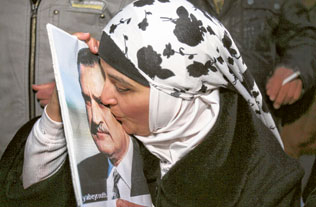
Cairo: Al Tahrir Square hasn't seen such massive protests since 1967 when charismatic Egyptian President Jamal Abdul Nasser said he would step down from power.
"I have decided to quit altogether and irreversibly any official post and any political role and to return to the ranks of the masses," Abdul Nasser said addressing the crowd on June 9, 1967.
Abdul Nasser, an iconic leader of Arab nationalism, could hardly finish his address, when thousands of stunned people in Egypt and other Arab countries took to the streets, crying hysterically and demanding him to back down on his resignation as president of the Arab world's biggest country.
"I still remember this day vividly," said Sabry Mahmoud, who was 21 years old at the time. "On listening to Abdul Nasser saying he will step down, I felt dizzy. I rushed out to the street and joined many distraught people in Cairo who flocked to Abdul Nasser's house in Manshyet Al Bakri in eastern Cairo," Mahmoud told Gulf News.
Abdul Nasser's declared resignation came four days after the start of the Middle East War in which the Egyptian army was defeated by Israel. "Together with thousands of Egyptians who poured into Cairo from all parts of the country, we continued to demonstrate for two days. I dare say that almost no one of Egypt's 30 million people at the time did not participate. We continued like this until Abdul Nasser bowed to the will of people," added Mahmoud, who cannot ignore the irony in present-day Egypt where thousands of Egyptians have been demonstrating in central Cairo for 12 days to press for the ouster of President Hosni Mubarak.
Born on January 15, 1918, Abdul Nasser grew up and attended military academy. He fought in the 1948 Arab Israeli war. Together with a group of army officers, Abdul Nasser launched a revolution in Egypt on July 23, 1952 when they toppled the monarchy.
In January 1955, pro-Nasser revolutionaries, officially known as the Revolutionary Command Council (RCC) appointed Abdul Nasser as president, pending an election to the office. Abdul Nasser's popularity grew during the Suez Crisis in 1956 when he announced the nationalisation of the Suez Canal following the refusal of the World Bank to finance the building of the High Dam in Aswan, Upper Egypt.
Nasser died of a heart attack on September 28, 1970.











